The Mitsui & Co. Environment Fund
Introduction to Grant Projects
Tohoku University, Graduate School of Life Sciences Professor: Jotaro Urabe
Ten-year evaluation of the Great East Japan Earthquake through citizen participation-type research, aiming for coastal ecosystem conservation for a sustainable society
Research grant
- Project Description
How will the ecosystem adapt to and recover from disturbance from a tsunami? To evaluate this correctly, it is necessary to analyze 10-year survey data. Therefore, since the year of the Great East Japan Earthquake, citizen participation-type biological monitoring research in tidelands has been carried out. This year monitoring will continue, and is planned to continue until the tenth year since occurrence, and the impact of subsequent disaster infrastructure developments, and the impact of the earthquake on the ecosystem, will be revealed. Also, information on the biological interaction of tideland ecosystems will be gathered from field experiments and surveys. Based on these results, sustainable coastal ecosystem conservation methods will be proposed. [No. R17-1011]
- Fields
- Ecosystems and the Symbiotic Society
- Grant year
- FY2017 Research Grants
- Grant term
- Three years (From April 2018 to March 2021)
- Grant amount
- 10.8 million yen
- Activity region
- Sendai Bay coastline; Matsukawaura, Torinoumi, Hiroura, Higashiyachi, Gamo. Matsushima Bay; Katsurashima Island, Sabusawajima, Hatsutsuura. Miyako; Tsugaruishi

Overview of the Organization

- Project organization
- Tohoku University
Graduate School of Life Sciences - Representative
- Professor: Jotaro Urabe
- Profile
- Specialist field: Ecology
Affiliated academic societies: Chairman of The Ecological Society of Japan, Trustee of The Japanese Society of Limnology, Director of The Ecology and Civil Engineering Society, Editor of OIKOS
Background:
1987: Withdrew from a doctorate degree from Tokyo Metropolitan University's Graduate School of Science
1988: Became a Doctor of Science (Tokyo Metropolitan University)
1989: Appointed as Arts and Science Researcher at the Natural History Museum and Institute, Chiba
1993: Appointed Assistant Professor at Tokyo Metropolitan University's Department of Science and Biological Science
1995: Appointed Associate Professor at the Center for Ecological Research, Kyoto University
2003: Appointed Professor at the Graduate School of Life Science, Tohoku University
Mr. Urabe engages in research relating to biological diversity concerning environmental change and the structural determination mechanism of biological communities, particularly in lake, river, and coastal ecosystems - Research record
-
- J. Urabe and T. Nakashizuka (2016) Ecological Impacts of Tsunamis on Coastal Ecosystems: Lessons from the Great East Japan Earthquake, Springer.
- Urabe Jotaro, 2016, 'Origin of the biotic community as understood from the tsunami', published in 'The Ecological Society of Japan (North Eastern region) talks about ecology of the Great Eastern Japan Earthquake', published by Kyoritsu Publishing
- Urabe Jotaro, 2014, 'Reconstruction law of lakes and marshes in the past', Kyoritsu Publishing
- Urabe Jotaro, Suzuki Takao, 2012, 'Importance of monitoring biological diversity for tsunami impact assessment and environmental restoration using tidal ecosystems as an example', Journal of Water and Waste, 54:71-78
- Takeda Hiroki, Urabe Jotaro, 2006, 'Global Environment and Ecosystems: Science of Land Ecosystems, Kyoritsu Publishing
- WEB site
- http://tohokuecology.jp/urabe/JUrabe_lab.html